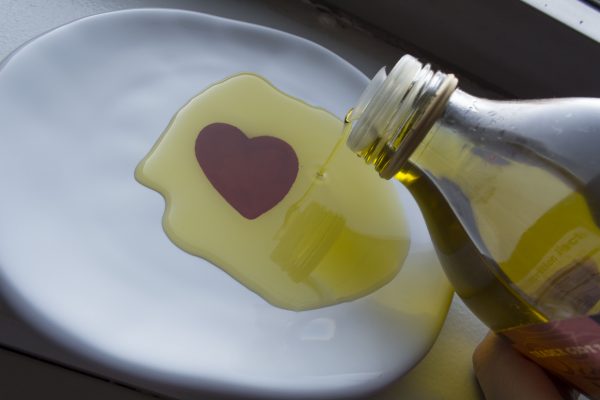The Benefits of Olive Oil
Studies have highlighted the health benefits of using olive oil as an ingredient when cooking as opposed to other options. (KATARINA MARSCHHAUSEN/THE OBSERVER)
February 24, 2017
Olive oil is a staple in what is commonly called “The Mediterranean Diet.” People in the Mediterranean region consume a large amount of olive oil per year. According to one source, each person in Greece alone tends to consume 24 liters of olive oil per year. Interestingly, the people of the Mediterranean have the lowest cancer risks of anyone in the world, and olive oil is suspected to have something to do with that.
Olive oil is beneficial because it is full of antioxidants, which helps prevent heart disease. “Fats that are high in what we call monounsaturates are one of the things that seem to promote better cardiac health, and olive oil seems to be one of them,” Fordham lecturer and biologist, Dr. Robert Madden stated.
Antioxidants help strengthen the immune system. The antioxidants in olive oil are also believed to be helpful against being inflicted with cancer. Olive oil also helps prevent strokes and protects against diabetes, specifically Type 2. Moreover, the intake of olive oil has been shown to have beneficial effects on blood sugar. Because olive oil is anti-inflammatory, it helps reduce the effects of rheumatoid arthritis. Olive oil can also help improve bone formation and brain health.
Surprisingly, olive oil is one of the few fats that does not cause one to gain weight because it is made of monounsaturated fatty acids. Olive oil helps control the amount someone eats and helps make people less hungry. Monounsaturated fats cause the body to burn fat even if one isn’t doing anything at all. The body uses the fats as a fuel source and increases the amount of energy one has while resting. This means that one could lose weight as they sleep because the monounsaturated fats will burn more calories.
This is the healthiest type of fat and helps lower cholesterol levels. In Greece, the main ingredient in almost all foods is olive oil. Extra virgin olive oil is considered the better olive oil because its ingredients are most pure. Extra virgin olive oil also has a fruitier taste and is of a much higher quality. The texture is more rich and thicker than regular olive oil.
Olive oil also makes foods taste fresh and healthy, as opposed to butter. Because of this, olive oil can help make someone a healthier eater.
Even though olive oil is good for one to add to meals, it doesn’t mean one should overuse it. Anything that is too oily or fatty can be also detrimental to one’s health. Olive oil has many calories, so consuming too much of it without exercise can be damaging.
Olive oil is also beneficial to hair. The fatty acids from the olive oil can keep hair healthy and smooth. This ingredient can help treat dandruff, tame frizzy hair, make hair look shinier, makes hair manageable and softens hair.
Additionally, olive oil also strengthen nails because of the polyphenols and anti-bacterial and fungal properties found in it. By soaking nails in olive oil once a week for twenty minutes, nails will grow healthier, stronger and faster.
Surprisingly, just the smell of olive oil can help you lose weight. Studies show that the smell of olive oil give people a high level of seratonin—which is a hormone that helps people feel full and happy.









